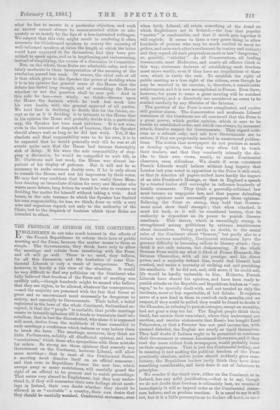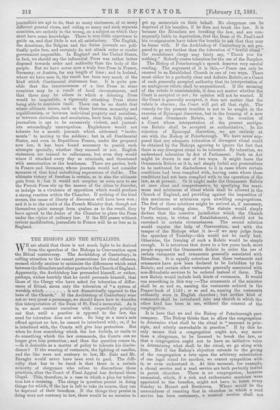THE FREEDOM OF OPINION ON THE CONTINENT.
ENGLISHMEN do not take much interest in the efforts of the French Republicans to reform their laws of public meeting and the Press, because the matter seems to them so simple. The Governments, they think, have only to allow the meetings and refrain from interfering with the Press, and all will go well. There is no need, they believe, for all this discussion, and the hesitation of some Con- tinental Liberals is only a result of inexperience. That, however, is hardly a fair view of the situation. It would be very difficult to find any politician on the Continent who fully believed that freedom of the Press and of meeting was entirely safe,—though hundreds might be named who believe that they are rights, to be allowed, whateveithe consequences, —and the majority are possessed with the fear that forces so great and so unrestrained must necessarily be dangerous to society, and especially to Governments. Their belief, a belief registered in the laws of the whole Continent, Switzerland ex- cepted, is that the " people " is excitable, that public meetings create or intensify agitation till it tends to transmute itself into rebellion, that in fact the discontented, who alone it is supposed will meet, derive from the multitude of those assembled in such meetings a confidence which induces or may induce them to break the laws. The meetings, moreover, they think are little Parliaments, solidify all disaffected opinion, and issue "resolutions," which those who sympathise with them mistake for orders. So strong are these opinions that scarcely any Government on the Continent, however Liberal, will allow mass meetings ; that in most of the Continental States, a meeting must dissolve itself on an official summons ; and that oven in Republican France the new law, which sweeps away so many restrictions, will carefully guard the right of an official to be present and to watch proceedings. That seems very absurd to Englishmen, but they may under- stand it, if they will remember their own feelings about meet- ings in Ireland, their own doubt whether they should be allowed in so " excitable " a country, their own desire that they should be carefully watched. Continental statesmen, even
when fairly Liberal, all retain something of the dread on which Englishmen act in Ireland,—the fear that popular " matter " is combustible, and that if much gets together it will explode. It seems to them a very grave thing to allow hundreds of persons who may be much excited to meet to- gether, and raise each other's excitement by oratory and contact; and they regard all such proposals as more or less " dangerous," or, possibly, "suicidal." As all Conservatives, all leading bureaucrats, most Moderates, and nearly all officers think in this way, statesmen desirous of establishing such freedom must move warily, oven if they have no trepidations of their own, which is rarely the case. To establish the right of public meeting as a true right of the citizen, even though he may be watched in its exercise, is, therefore, a considerable achievement, and it is now accomplished in Franco. Even there, however, for years to come a groat meeting will bo watched with anxiety, and a disorderly one considered an event to be studied carefully by any Minister of the Interior.
The question of the Press is more complicated, and excites still greater alarm. The Conservative and moderate Liberal statesmen of the Continent are all convinced that the Press is a great power, which guides opinion, which is sure to be hostile to established order, and which can always, by incessant attack, dissolve respect for Governments. They regard criti- cism as a solvent only, and ask how Governments are to
endure, if they are perpetually assailed in unanswered publica- tions. The notion that newspapers do not produce so much as develop opinion, that -they very often fail to touch their readers, and that they constantly intensify the dis- like to their own views, would, to most Continental observers, seem ridiculous. We doubt if even consistent French Liberals would believe without long inquiry that London last year voted in opposition to the Press it still read, or that in America all papers united have hardly the impact of an able President's Message, or that in England a speech by a trusted loader still outweighs in influence hundreds of
hostile comments. They think a generally-criticised law must become an unpopular law, and that papers defending violent opinions must necessarily propagate those opinions. Believing the Press so strong, they hold that Govern- ment must show itself stronger ; that when attacked, it must hit back, or it will be considered beaten, that its authority is dependent on its power to punish literary
assailants. This theory, which is exceedingly strong, is strengthened among politicians by extreme sensitiveness about themselves, Owing partly, no doubt, to the social rules of the Continent about "honour," but partly also to a certain nervous sensibility, Continental statesmen have the greatest difficulty in becoming callous to literary attack ; they think it not only ruinous, but dishonouring. If the whole German Press could say what it liked of Prince Bismarck, the German Chancellor, with all his prestige, and his direct power, and a majority behind him, would feel himself half crushed, and under a necessity of striking out and punishing his assailants. If he did not, and, still more, if he could not life would be hardly endurable to him. Hitherto, French Liberals have shared his opinions, and have been ready to punish attacks on the Republic and Republican leaders as " out- rages," to be specially dealt with, and not treated as only the incidents, more or less regrettable, of hot debate. It requires. nerve of a new kind in them to overlook such assaults, and we suspect, if they could be polled, they would be found to doubt if the Chamber, in refusing to punish outrages, except on morality, had not gone a step too far. The English people think them timid, but outside their own island, where they understand one another, and receive statements that Russia has bought Lord Palmerston, or that a Premier has not paid income-tax, with amused disbelief, the English are nearly as timid themselves. They half doubt if Indians ought to be permitted to condemn their Government or censure Lieutenant-Governors, and if they read the more violent Irish newspapers, would probably insist on their suppression. That is just the Continental feeling, and in resisting it and making the political freedom of the Press practically absolute, unless juries should suddenly grow reac- tionary, the Republican leaders justly think they have done something considerable, and have done it out of deference to principles. We wonder if the timid view, either on the Continent or in
Ireland, has any solid justification,—that is to say, though we do not doubt that freedom is ultimately best, we wonder if
immediately it will so imperil order as the Continental states- men believe, and so produce reaction. It is usual to say it will not, but it is a little presumptuous to declare off-hand, as most journalists are apt to do, that so many statesmen, of so many different general views, and ruling so many and such separate countries, are entirely in the wrong, on a subject on which they must have some knowledge. There is very little experience to guide us, and that little is not all satisfactory. The English, the American, the Belgian and the Swiss journals are poli- tically quite free, and certainly do not attack order or render government impossible. In England and the United States, in fact, we should say the influential Press was rather better disposed towards order and authority than the body of the people. But we have never seen a truly free Press in France, Germany, or Austria, for any length of time ; and in Ireland, where we have seen it, the result has been very much of the kind which Continental statesmen fear. It is quite pos- sible that the innocuousness of a free Press in some countries may be a result of local circumstances, and that there may be others in which a debating Press would be impossible, a vigorously attacking Press alone being able to maintain itself. There can be no doubt that where ultimate issues, such as those between monarchy and republicanism, or between individual property and socialism, or between clericalism and secularism, have been fully raised, journalism is apt to be excessively violent, and journal- ists astoundingly unscrupulous. Englishmen would not tolerate for a month journals which addressed " incite- ments " to mutiny to the soldiers ; but in all Continental States, and even in Republican France, under the proposed new law, it has been found necessary to punish such attempts specially, whether they succeed or not. English statesmen are trained to callousness, but even they would wince if attacked every day as criminals, and threatened with assassination or the headsman. There are parties, both in France and Germany, whose journals would not consider menaces of that kind unbefitting expressions of dislike. The ultimate victory of freedom is certain, as is also the ultimate gain from it ; but it would not surprise us even now to see the French Press stir up the masses of the cities to disorder, or indulge in a virulence of opposition which would produce a strong reaction within the Chamber. If nothing of the kind occurs, the cause of liberty of discussion will have been won ; and it is to the credit of the French Ministry that, though not themselves quite exempt from qualms as to the result, they have agreed to the desire of the Chamber to place the Press under the regime of ordinary law. If the Bill passes without serious modification, journalists in France will be as free as in England.



































 Previous page
Previous page